 1980-1985
1980-1985
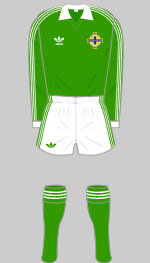
1980-1982
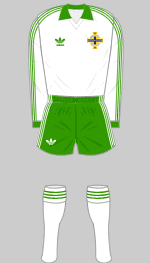
1980-1981 Change
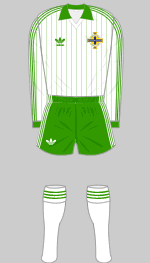
1982-1985 Change
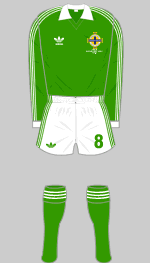
1982 World Cup Finals
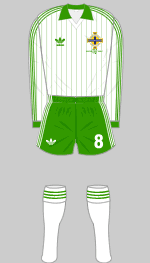
1982 WCF Change
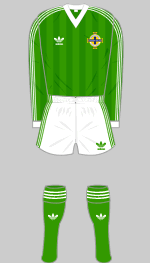
1983
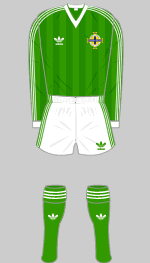
Dec 1983-1985
Designer: Adidas
Adidas' kits evolved by small steps during this period. The 1980 "home" kit was identical to the version introduced in September 1977 with the original green V neck and made its first appearance against Sweden in October 1980. The white and green change kit was retained until 1981, when it was updated with fashionable pinstripes. For the 1982 FIFA World Cup Finals in Spain, commemorative script was added below the crest: due to FIFA's rules, the white strip was used in three out five of Northern Ireland's games. A 1-0 win over hosts, Spain, in the first round was one of the teams finest ever results.
In May 1983, Adidas introduced an updated "home" kit with shadow stripes, the pinstriped white change kit being retained. The new outfit made its debut in the British Home Championship in May and had a plain white V neck. Green trim was added for the match against Scotland in December and remained in place until the shirt was retired.
 1986-1990
1986-1990
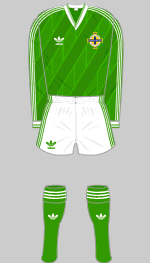
1986-1990
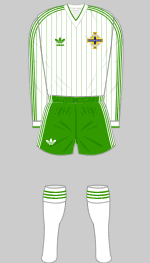
1985-1986 Change
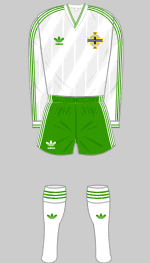
1986-1990 Change
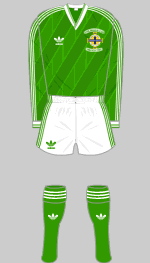
1986 World Cup Finals
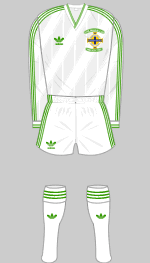
1986 WCF v Spain

1986 WCF v Algeria
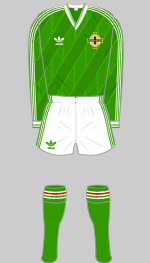
1988 v Hungary
19 Oct 1988
Designer: Adidas
Northern Ireland qualified for their third World Cup finals, their second in succession alongside England from a tough group that included Romania, Finland and Turkey. A few months before the finals themselves, held in Mexico, Adidas launched their new kits. (The 1985-86 change kit was worn just once, in a pre-tournament warm-up game with France before the new range was introduced.) Mirror images of each other, the new home and away shirts featured subtle diagonal shadow stripes combined with vertical pinstripes. The advantage of wearing Adidas' mix and match designs was illustrated in the tournament itself when the Ulstermen wore different combinations in their three group games.
The crest was also modified, the words "Northern Ireland" being added to the horizontal bar on the celtic cross.
In 1988 the team travelled to Budapest for a World Cup qualifier with white socks to avoid a clash with those of Hungary. The home team, however, wore all-white so the Irish borrowed a set of socks for the match
By the time that this kit was retired in 1990, Northern Ireland's flush of success had run its course.
 1990-1994
1990-1994
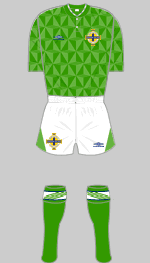
1990-1992
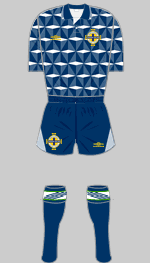
1990-1993 Change
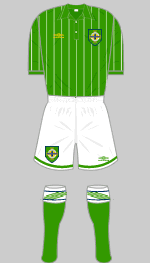
1992-1994
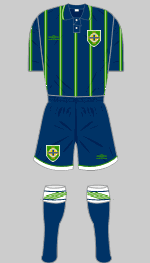
1993-1994 Change
Designer: Umbro
In 1990 Umbro resumed their relationship with the IFA and introduced an extraordinary set of kits with a repeated geometric pattern. Opinion was divided on the design but the reintroduction of navy blue to the national team's pallette was a welcome reminder of Ireland's early heritage. The navy "away" kit was retained for three years to allow the IFA to adopt the practice of rotating their new kits for the replica market.
The 1992 kit was a standard Umbro template (also worn by Nottingham Forest in red), featured the IFA's celtic cross emblem within a fashionable shield and re-introduced long shorts. The new all-navy away kit that, launched in 1993, was another standard template (Celtic ordered a black set) and was worn when Northern Ireland were beaten 0-3 by the Republic of Ireland in a World Cup qualifier.
 1994-1998
1994-1998
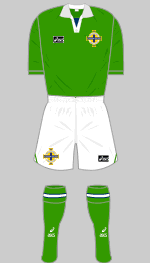
1994-1996
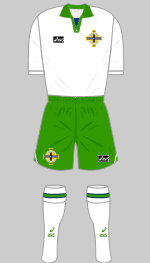
1994-1996 Change
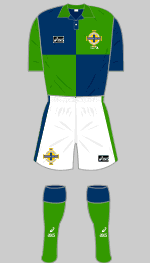
1996-1998
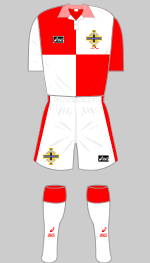
1996-1998 Change
Designer: Asics
The Japanese sportswear company, Asics, won the contract to supply Northern Ireland's kit at the end of 1993 and launched the partnership with two classically interchangeable sets. By one of those ironic twists of fate that make international football so absorbing, Northern Ireland were once again paired with the Republic of Ireland in the Euro 96 qualifiers, suffering a 0-4 defeat wearing their new green tops.
Asics' next design was an adventurous affair that combined the modern green with the old blue in a quartered shirt, a layout that has never before featured on the international stage. A ribbed collar completed the ensemble and for the first time, match details were embroidered below the crest. The away kit was identical in design but in red and white. These are the colours of the flag of Ulster but had never before featured in any of the strips worn by teams representing the province in any sport.
 1998-1999
1998-1999
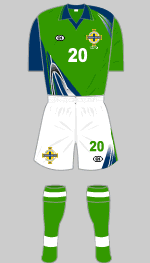
1998-1999
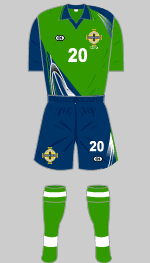
1998-1999 Alternate
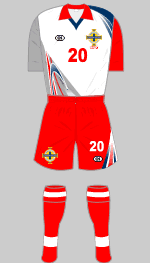
1998-1999 Change
Designer: Olympic Sportswear
The IFA turned to Olympic Sportswear, a minor player in the international kit market whose "05" design also proved popular with a few clubs in the lower levels of the English and Scottish leagues. The combination of green and navy blue in the 05 template certainly made for a striking effect but it was worn in only one victory, a 1-0 home win against Finland. The "away" kit retained the red and white theme from the last Asics kit with additional silver grey and navy features. Squad numbers now featured on the front of shirts as well as on the shorts.
Northern Ireland wore their red and white kit in a charity match against the Republic organised in 1999 to raise funds for the victims of the Omagh bombing, which had occurred the previous August, killing 29 and injuring 220. Despite this attempt by dissident hard-line republicans to derail the peace process, the Good Friday Agreement, signed on 10 April 1998, held firm and the security situation in Ulster gradually normalised.
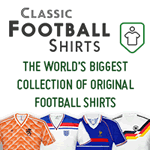
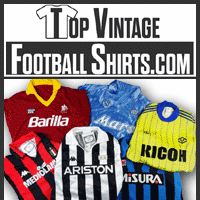
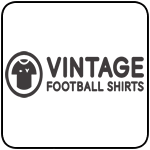
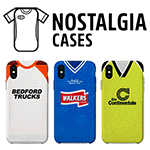
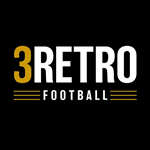
 Northern Ireland qualified for the World Cup Finals in 1982 and again in 1986 under the management of Billy Bingham who had himself been a member of the 1958 side, the only Northern Ireland team to have qualified. They also beat West Germany twice in the qualifiers for the 1984 European Championships but failed to reach the final stages. The team won the Home International Championship outright in 1980 and 1984, the last time the competition was held. Their on-field successes were overshadowed to a degree by the worsening security situation which led to the Home International Championship being abandoned in 1981, after England and Wales refused to play in Belfast.
Northern Ireland qualified for the World Cup Finals in 1982 and again in 1986 under the management of Billy Bingham who had himself been a member of the 1958 side, the only Northern Ireland team to have qualified. They also beat West Germany twice in the qualifiers for the 1984 European Championships but failed to reach the final stages. The team won the Home International Championship outright in 1980 and 1984, the last time the competition was held. Their on-field successes were overshadowed to a degree by the worsening security situation which led to the Home International Championship being abandoned in 1981, after England and Wales refused to play in Belfast.  1980-1985
1980-1985























